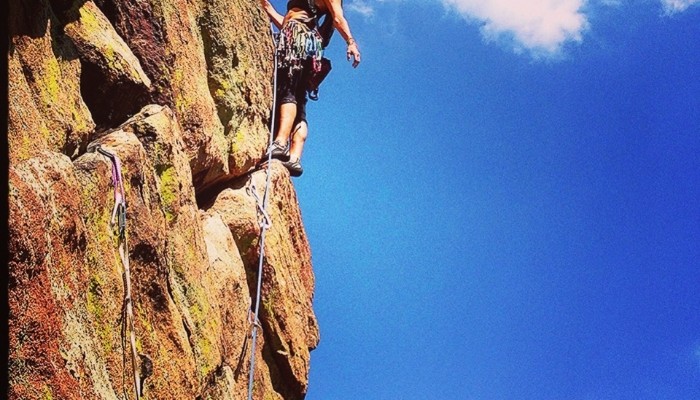“In the mountain of truth, one never climbs in vain, you either reach a higher step today or exercise your strength to climb higher tomorrow.” –Nietzsche
It seems a fitting time for me to be reflecting about mountains, as I spend a large portion of my summer in Colorado, with the backdrop of the Rockies as my visual inspiration. I lived in Boulder for a decade and found my way back to the shoreline nearly seven years ago. I still feel connected to the movement on the rock and life in the mountains when I return here to play each summer.
I was an unlikely candidate for a rock climbing and mountaineering instructor, having grown up on the eastern seaboard on a boat for the majority of my childhood. When I say boat, I mean living aboard for months and years at a time being homeschooled. I felt like I lived half of my life underwater. I dreamed of being a marine biologist–I dreamed underwater.
Until I took my first trip out west as a teenager and saw mountains. I remember being completely captivated; I didn’t think they were real. It was a few years later, in college, that I decided I wanted to climb rocks and made everything happen to be able to do that. I hiked and climbed mountains in Maine, got wilderness medicine and CPR training and then left the cold, long winters to move to Arizona where I heard the rock was plentiful and warm. I ended up in California after college, explored the Pacific Northwest and settled in the Colorado Rocky Mountains to pursue my passion in the mountain wilderness.
Here are a few life lessons I have learned from nearly twenty years climbing rocks and mountains.
1. Humility: This one took a long time for me to embrace. I have spoke often about how becoming the identity of anything can take us away from our true essence. When we attach our identity to our doing, as a climber, mountaineer, runner, etc., we run the risk of being attached on an ego level to performance. I am not saying that it’s not great to excel and achieve greatness in our passion, but to identify solely as our sport we forget we are more than our body and physical pursuits. I lost a few friends along the way when I simply didn’t make time for them and climbing was all that mattered. I also lost a sense of myself when I became injured and couldn’t climb for a while. I had to remind myself that I was more than my climbing. That climbing did not validate my worth. How many of us have allowed our work to become our identity, claiming fancy titles and little letters next to our name as proof that we are worthy? Getting injured reminded me that as much as I love climbing, it was not going to define me as worthy, good or bad.
2. Being a part of something greater than myself: For obvious reasons, just getting out in nature, be it mountains, rivers, oceans or swamps, reminds us of how small we are in the great scope of our planet. It’s nice to let go and let our own rhythm syncopate with the pace of our natural surroundings. There is no judgment, no rushing and no expectations out in nature. Cue my favorite Buddhist teaching: Just as a solid rock is unshaken by the wind, so are the wise unshaken by praise, nor blame.
3. The magic happens on the side of a mountain. I have seen plenty of climbing and mountain expeditions fail and friendships fall apart due to competition, ego and lack of patience along the journey. While it’s important to have the ultimate goal and objective of a summit or successful climb, who and what will you have at the end of your summit goal? If you have sacrificed your health, friendships and missed the lessons along the way, how successful were you? If you can stay committed to the journey, truly believing that the sides of the mountain are the journey, just as important as the summit, then you will never have a bad expedition. Every step along the way offers lessons and opportunities, whether you make it to the top or not.
4. Nature as the ultimate teacher: Nature is the great equalizer. I have always appreciated the smallness of humanity amidst the vastness of the great outdoors. When it rains in the mountains, we all get wet, when temperatures drop, we get cold. The material plentiful and poor alike are on the same level when faced with nature’s elements. This reminds us that we are more similar than dissimilar; that again, humility is the key to fostering compassion for our basic human-ness that connects us more than divides us. We all cry the same tears when we lose the ones we love. We all breathe the same air that unites us as breathers on this planet. Being outside, exposed and vulnerable to the elements reminds us to be more compassionate to others and ourselves.
5. Bring layers; the weather changes: Hmmm. Kind of like life; everything is subject to change. I used to watch my wilderness students shivering in the evenings with their fleece shirts unzipped. I would be all bundled up in my hat and warm down jacket zipped to my chin and not feel sorry for them. I told them there was no reason to be cold and uncomfortable out here. I would implore them to zip up and put more layers on (they were too cool to wear hats). It’s not necessary to suffer, even in the harshest conditions. If you have the gear, the layers, the equipment, use it! Find the comfort even in the uncomfortable moments. Many of us have the resources–the “layers” so-to-speak–in our lives already but we are too proud, scared or unaware to use them. Gather your tools, your support system and take care of them because you never know when the weather in your life is going to change. Life, just like mountain weather, is unpredictable. Suffering is optional.
6. False Summits: When hiking or climbing mountains it’s not uncommon to think you’re near the top, you believe you spy that summit and arrive to find the actual summit eludes you further forward and far higher. It’s common to have that scenario repeat sometimes several times over hours and perhaps days in the mountains. Life’s false summits keep coming also. Don’t give up. The reward of the true summit cannot be completely felt or even achieved without the (somewhat masochistic) enduring challenge and hard work along the way. I once heard that 70% of people who get lost (driving, walking, hiking or otherwise) didn’t go far enough. What we are truly seeking in life is big–don’t settle for a false summit–keep going to the top.
7. Leave No Trace: Leave No Trace© is one of my favorite teaching curriculums about ethical and responsible use of the outdoors. It’s practical education and outreach programs teach people to be stewards of our beautiful outdoors, understand our impact on the planet in which we live and play and strive to minimize that impact and leave it a better place for our children’s children. These principles apply to our own families, relationships and even non-natural spaces. How can we leave things a little nicer than when we got there? How can we make it better for the next person? Take only pictures, leave only footprints…the less we feel the need to mark our territory and leave our human stamp everywhere we go, the less war, the less crime and the more love and connection we will feel. Sounds super sappy, but I totally believe it. Check out the Leave No Trace organization.
Mountains have a way of humbling us, if we accept the opportunity. Mountains have a way of connecting us to ourselves, nature and to others, by simply being out there. Mountains have a way of challenging us so we learn we can handle more, achieve more and feel stronger.
Embracing adventure means knowing it’s not always going to turn out exactly the way we want it or expect it to and so are the mountains, just like life.

